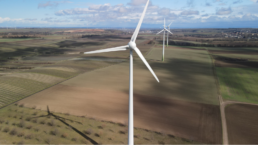A new chancellor and his coalition want to enact major clean energy legislation at the same time that the war has scrambled the geopolitics of energy.
By Dan Gearino, Inside Climate News
Vladmir Putin’s invasion of Ukraine has made Germany’s reliance on Russian oil and gas untenable, and led the center-left government of Chancellor Olav Scholz to accelerate the transition to clean energy.
This is more than just talk. German leaders are in the early stages of showing the world what an aggressive climate policy looks like in a crisis. Scholz and his cabinet will introduce legislation to require nearly 100 percent renewable electricity by 2035, which would help to meet the existing goal of getting to net-zero emissions by 2045.
“Our goal of achieving climate neutrality in Germany by 2045 is more important than ever,” Scholz said this week in an address to parliament.

Germany’s strategy is in contrast to the United States, where the Biden administration, also elected with ambitious climate plans, has seen that part of its agenda almost completely stalled.
The difference is that Germany—and much of the rest of Europe—have a head start on the United States in making a transition to clean energy, said Nikos Tsafos of the Energy Security and Climate Change Program at the Center for Strategic and International Studies, a Washington-based think tank.
“There is more social and political consensus in favor of decarbonization [in Europe], and the plans and strategies are far more developed,” Tsafos said in an email. “By contrast, climate legislation remains highly politicized in the United States, and the instinct among many is to merely increase oil and gas production.”
Germany’s actions on climate and clean energy hold special relevance for the United States because both nations have large economies built on heavy industry and plentiful fossil fuels. Germany adopted groundbreaking renewable energy incentives in the 2000s, making it a model for others. It has continued since then with decades of progress, along with a recurring theme of frustration that progress has often not been fast enough.
Scholz and his coalition want to build on this legacy, even as bullets and artillery rounds are flying in Ukraine.
Recent Posts
Gavin Newsom’s last budget belies his ‘California for All’ pledge
February 24, 2026
Take Action Now Yet, even as the state is poised to lose billions in federal funding, and millions of Californians are losing access to health care…
Israel and American Hawks are Pushing U.S. to Iran War With Catastrophic Consequences
February 23, 2026
Take Action Now At the World Health Assembly in May, member states may endorse an unprecedented strategy declaring that health is not a cost – but…
A Child’s View of the Attack on Venezuela. And a Peace Flotilla
February 23, 2026
Take Action Now At the World Health Assembly in May, member states may endorse an unprecedented strategy declaring that health is not a cost – but…
How to Organize Safely in the Age of Surveillance
February 22, 2026
Take Action Now From threat modeling to encrypted collaboration apps, we’ve collected experts’ tips and tools for safely and effectively building a…




